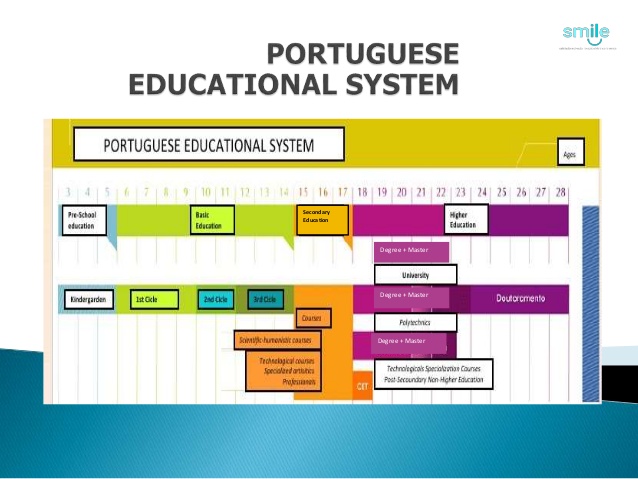The Portuguese School System (work in progress)
It is composed by:
Preschool education (not compulsory)
- For children between the ages of three and five
- Provided by kindergartens, ("creche" or "infantário")
- Some people opt to educate their children by themself at home
Compulsory schooling: Basic education (compulsory and free) (6-15 years old)
This level of teaching extends over nine years and comprises three cycles:
- The first cycle lasts for four years of study and is taught by one teacher
- The second cycle, lasting two years, covers interdisciplinary areas of basic education
- The third cycle lasts for three years and is structured as a set of disciplines or groups of disciplines. Classes are taught by a single teacher per subject.
Post-compulsory schooling: Secondary education (compulsory)
- It lasts three years, corresponding to school years 10, 11 and 12.
- Children enter this stage aged fifteen (providing they did not have to retake any years at primary school)
- It is a cycle intended principally to prepare young people to go on to higher education or to enter the labour market.
Before starting secondary school pupils will have to decide whether to opt for:
|
GENERAL EDUCATION
|
VOCATIONAL TRAINING
|
|
Science and technology
|
Administration, computing
|
|
Social Economics
|
Civil construction, dance
|
|
Language, literature and visual arts
|
Marketing, sport and music
|
Secondary education is assessed via a marking scheme of 0-20. To pass you will need 10 or above.
| 10-13 is sufficient |
| 14-15 is good |
| 6-17 is very good |
| 18-20 is excellent |
Students will move on into the next year of education if they pass their exams.
(If you don't go to school, the police will contact your parents and ask what is happening. They will also find a way to solve the problem, because going to school is cumpulsory for all children in Portugal.)
The Higher Education System :
There are two systems of higher education in Portugal : universities and polytechnics (public or private).
The degrees offered by the Portuguese higher education system are as follows :
| 1st Cycle |
2nd Cycle |
3rd Cycle |
| Bachlor's (3-4 years) |
Master's (1-2 years)
|
PhD (3 or 4 years)
|
In Portugal, access to higher education is always subject to the Numerus Clausus system, whereby a limited number of places are fixed by each individual institution. In addition, institutions determine selection criteria and minimum entry grades for applicants.

International schools in Portugal :
You can find English-speaking international schools in Portugal, especially in primary and secondary education. These schools are mostly found in the Greater Lisbon area and the Algarve.
Holidays in Portugal :
- The school semester usually starts between the 8th and 13th of September.
- Christmas holidays last for just under two weeks: around 18th – 2nd January.
- There is a two day break in February to celebrate carnival (around 12th - 14th February) and a ten day Easter break (around 26th March – 6th April).
- Summer holidays start around mid June.
A typical day at school :
Our classes start at 8.30 a.m. Each class takes usually about 90 minutes, so we have a 15 minute break at 10 a.m. The second class in the morning finishes at 11.45 a.m, and the last one at 13.30 p.m
On Monday,Wednesday and Friday we go home before lunch at 13.30 p.m, but on Tuesday and Thursday we only leave school at 17 p.m.
How classes are made :
In the classrom we are sitting alphabetically at tables of two.
Our class has 28 pupils,
The teacher usually uses the interactive board and the computer as hers supports to teach.
(work in progress...)